Deck 23: Amines
Question
Question
Question
Question
Question
Question
Question
Question
Question
Question
Question
Question
Question
Question
Question
Question
Question
Question
Question
Question
Question
Question
Question
Question
Question
Question
Question
Question
Question
Question
Question
Question
Question
Question
Question
Question
Question
Question
Question
Question
Question
Question
Question
Question
Question
Question
Question
Question
Question
Question
Question
Question
Question
Question
Question
Question
Question
Question
Question
Question
Question
Question
Question
Question
Question
Question
Question
Question
Question
Question
Question
Question
Question
Question
Question
Question
Question
Question
Question
Question

Unlock Deck
Sign up to unlock the cards in this deck!
Unlock Deck
Unlock Deck
1/88
Play
Full screen (f)
Deck 23: Amines
1
What is the IUPAC name of the following compound? 
A)(3R,4S)-3-amino-4-methylcyclohexene
B)(3R,4R)-3-amino-4-methylcyclohexene
C)(4R,5S)-5-amino-4-methylcyclohexene
D)(4R,5R)-5-amino-4-methylcyclohexene

A)(3R,4S)-3-amino-4-methylcyclohexene
B)(3R,4R)-3-amino-4-methylcyclohexene
C)(4R,5S)-5-amino-4-methylcyclohexene
D)(4R,5R)-5-amino-4-methylcyclohexene
(3R,4S)-3-amino-4-methylcyclohexene
2
What is the correct assignment of the names of the functional groups in the following nitrogen-containing compounds? 
A)1 = amide; 2 = 2 amine; 3 = oxime
B)1 = imine; 2 = oxime; 3 = hydrazone
C)1 = 2 amine; 2 = oxime; 3 = hydrazine
D)1 = imine; 2 = hydrazone; 3 = 2 amine

A)1 = amide; 2 = 2 amine; 3 = oxime
B)1 = imine; 2 = oxime; 3 = hydrazone
C)1 = 2 amine; 2 = oxime; 3 = hydrazine
D)1 = imine; 2 = hydrazone; 3 = 2 amine
1 = imine; 2 = oxime; 3 = hydrazone
3
What is the major organic product obtained from the following reaction? 
A)1
B)2
C)3
D)4

A)1
B)2
C)3
D)4
2
4
What is the hybridization of the nitrogen atom of pyridine?
A)s
B)sp
C)sp2
D)sp3
A)s
B)sp
C)sp2
D)sp3

Unlock Deck
Unlock for access to all 88 flashcards in this deck.
Unlock Deck
k this deck
5
What is the correct assignment of the names of the functional groups in the following nitrogen-containing compounds? 
A)1 = 2 amine; 2 = enamine; 3 = hydrazine
B)1 = 2 amine; 2 = amide; 3 = nitrile
C)1 =oxime; 2 = hydrazone; 3 = nitrile
D)1 = imine; 2 = hydrazone; 3 = amide

A)1 = 2 amine; 2 = enamine; 3 = hydrazine
B)1 = 2 amine; 2 = amide; 3 = nitrile
C)1 =oxime; 2 = hydrazone; 3 = nitrile
D)1 = imine; 2 = hydrazone; 3 = amide

Unlock Deck
Unlock for access to all 88 flashcards in this deck.
Unlock Deck
k this deck
6
Which of the following compounds are primary (1 ) amines? 
A)1 and 2
B)1 and 3
C)1, 2 and 3
D)1, 2, 3 and 4

A)1 and 2
B)1 and 3
C)1, 2 and 3
D)1, 2, 3 and 4

Unlock Deck
Unlock for access to all 88 flashcards in this deck.
Unlock Deck
k this deck
7
What is the approximate pKa value of (CH3)3NH+, the conjugate acid of trimethylamine?
A)-2
B)5
C)10
D)25
A)-2
B)5
C)10
D)25

Unlock Deck
Unlock for access to all 88 flashcards in this deck.
Unlock Deck
k this deck
8
What is the major organic product obtained from the following reaction? 
A)1
B)2
C)3
D)4

A)1
B)2
C)3
D)4

Unlock Deck
Unlock for access to all 88 flashcards in this deck.
Unlock Deck
k this deck
9
What is the IUPAC name of the following compound? 
A)(R)-4-amino-2-methylhexane
B)(S)-4-amino-2-methylhexane
C)N-ethyl N-(3-methylpropyl) amine
D)(R)-3-amino-5-methylhexane

A)(R)-4-amino-2-methylhexane
B)(S)-4-amino-2-methylhexane
C)N-ethyl N-(3-methylpropyl) amine
D)(R)-3-amino-5-methylhexane

Unlock Deck
Unlock for access to all 88 flashcards in this deck.
Unlock Deck
k this deck
10
What is the hybridization of the nitrogen atoms labeled i and ii in the aromatic imidazole ring? 
A)i = sp2;; ii = sp2
B)i = sp2; ii = sp3
C)i = sp3; ii = sp3
D)i = sp3; ii = sp2

A)i = sp2;; ii = sp2
B)i = sp2; ii = sp3
C)i = sp3; ii = sp3
D)i = sp3; ii = sp2

Unlock Deck
Unlock for access to all 88 flashcards in this deck.
Unlock Deck
k this deck
11
Which of the following will remove aniline from a solution of aniline in diethyl ether?
A)aqueous KBr
B)aqueous HCl
C)aqueous NaOH
D)aqueous CH3COONa
A)aqueous KBr
B)aqueous HCl
C)aqueous NaOH
D)aqueous CH3COONa

Unlock Deck
Unlock for access to all 88 flashcards in this deck.
Unlock Deck
k this deck
12
Which of the following is the strongest base?
A)ammonia
B)dimethylamine
C)aniline
D)4-nitroaniline
A)ammonia
B)dimethylamine
C)aniline
D)4-nitroaniline

Unlock Deck
Unlock for access to all 88 flashcards in this deck.
Unlock Deck
k this deck
13
What is the IUPAC name of the following compound? 
A)(E)-1-amino-4-hexene
B)(E)-6-amino-2-hexene
C)3-allyl 1-aminopropane
D)(Z)-1-amino-2-hexene

A)(E)-1-amino-4-hexene
B)(E)-6-amino-2-hexene
C)3-allyl 1-aminopropane
D)(Z)-1-amino-2-hexene

Unlock Deck
Unlock for access to all 88 flashcards in this deck.
Unlock Deck
k this deck
14
Which of the following is the weakest base?
A)4-methylaniline
B)4-nitroaniline
C)aniline
D)4-chloroaniline
A)4-methylaniline
B)4-nitroaniline
C)aniline
D)4-chloroaniline

Unlock Deck
Unlock for access to all 88 flashcards in this deck.
Unlock Deck
k this deck
15
Which of the following compounds are secondary (2 ) amines?
1)(CH3)3CNHCH3
2)CH3CH(NH2)CH2CH3
3)CH3CH2CH2NHCH3
4)CH3CH2CH2CH2CH2NH2
A)1 and 2
B)1 and 3
C)1, 2 and 3
D)1, 2, 3 and 4
1)(CH3)3CNHCH3
2)CH3CH(NH2)CH2CH3
3)CH3CH2CH2NHCH3
4)CH3CH2CH2CH2CH2NH2
A)1 and 2
B)1 and 3
C)1, 2 and 3
D)1, 2, 3 and 4

Unlock Deck
Unlock for access to all 88 flashcards in this deck.
Unlock Deck
k this deck
16
Which of the following compounds are tertiary (3 ) amines?
1)(CH3)2CHN(CH3)2
2)CH3CH(CH3)N(CH2CH3)2
3)CH3CH2CH2NHCH3
4)CH3CH2CH2CH2CH2NH2
A)1 and 2
B)1 and 3
C)1, 2 and 3
D)1, 2, 3 and 4
1)(CH3)2CHN(CH3)2
2)CH3CH(CH3)N(CH2CH3)2
3)CH3CH2CH2NHCH3
4)CH3CH2CH2CH2CH2NH2
A)1 and 2
B)1 and 3
C)1, 2 and 3
D)1, 2, 3 and 4

Unlock Deck
Unlock for access to all 88 flashcards in this deck.
Unlock Deck
k this deck
17
Which of the following is the strongest base?
A)phenol
B)aniline
C)methylamine
D)4-nitroaniline
A)phenol
B)aniline
C)methylamine
D)4-nitroaniline

Unlock Deck
Unlock for access to all 88 flashcards in this deck.
Unlock Deck
k this deck
18
Which of the following is the weakest base?
A)aniline
B)3-nitroaniline
C)4-nitroaniline
D)4-methoxyaniline
A)aniline
B)3-nitroaniline
C)4-nitroaniline
D)4-methoxyaniline

Unlock Deck
Unlock for access to all 88 flashcards in this deck.
Unlock Deck
k this deck
19
What is the correct assignment of the names of the functional groups in the following nitrogen-containing compounds? 
A)1 = imine; 2 = hydrazone; 3 = amide
B)1 = 2 amine; 2 = amide; 3 = hydrazone
C)1 =oxime; 2 = hydrazone; 3 = nitrile
D)1 = amide; 2 = nitrile; 3 = hydrazone

A)1 = imine; 2 = hydrazone; 3 = amide
B)1 = 2 amine; 2 = amide; 3 = hydrazone
C)1 =oxime; 2 = hydrazone; 3 = nitrile
D)1 = amide; 2 = nitrile; 3 = hydrazone

Unlock Deck
Unlock for access to all 88 flashcards in this deck.
Unlock Deck
k this deck
20
What is the IUPAC name of the following compound? ![<strong>What is the IUPAC name of the following compound? </strong> A)1-aminobicyclo[2.2.2]octane B)2-aminobicyclo[2.2.2]octane C)4-aminobicyclo[2.2.2]octane D)2-aminobicyclo[6.4.4]octane](https://storage.examlex.com/TB1813/11ea7d75_f634_c3b8_b9bd_3720bbf61b18_TB1813_00_TB1813_00.jpg)
A)1-aminobicyclo[2.2.2]octane
B)2-aminobicyclo[2.2.2]octane
C)4-aminobicyclo[2.2.2]octane
D)2-aminobicyclo[6.4.4]octane
![<strong>What is the IUPAC name of the following compound? </strong> A)1-aminobicyclo[2.2.2]octane B)2-aminobicyclo[2.2.2]octane C)4-aminobicyclo[2.2.2]octane D)2-aminobicyclo[6.4.4]octane](https://storage.examlex.com/TB1813/11ea7d75_f634_c3b8_b9bd_3720bbf61b18_TB1813_00_TB1813_00.jpg)
A)1-aminobicyclo[2.2.2]octane
B)2-aminobicyclo[2.2.2]octane
C)4-aminobicyclo[2.2.2]octane
D)2-aminobicyclo[6.4.4]octane

Unlock Deck
Unlock for access to all 88 flashcards in this deck.
Unlock Deck
k this deck
21
What is the major organic product obtained from the following reaction? 
A)1
B)2
C)3
D)4

A)1
B)2
C)3
D)4

Unlock Deck
Unlock for access to all 88 flashcards in this deck.
Unlock Deck
k this deck
22
What is the major organic product obtained from the following sequence of reactions? 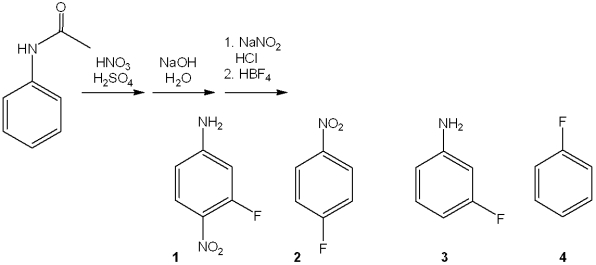
A)1
B)2
C)3
D)4

A)1
B)2
C)3
D)4

Unlock Deck
Unlock for access to all 88 flashcards in this deck.
Unlock Deck
k this deck
23
What is the major organic product obtained from the following reaction? 
A)1
B)2
C)3
D)4

A)1
B)2
C)3
D)4

Unlock Deck
Unlock for access to all 88 flashcards in this deck.
Unlock Deck
k this deck
24
What is the major organic product obtained from the following sequence of reactions? 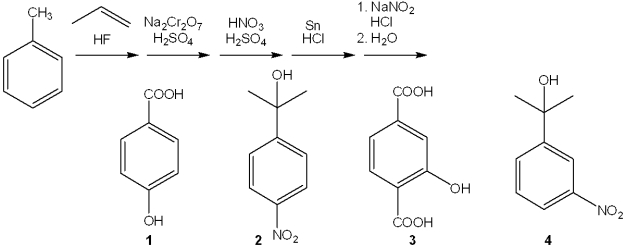
A)1
B)2
C)3
D)4

A)1
B)2
C)3
D)4

Unlock Deck
Unlock for access to all 88 flashcards in this deck.
Unlock Deck
k this deck
25
What is the major organic product obtained from the following reaction? 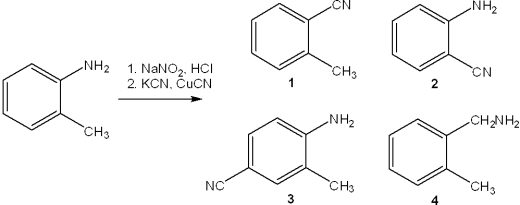
A)1
B)2
C)3
D)4

A)1
B)2
C)3
D)4

Unlock Deck
Unlock for access to all 88 flashcards in this deck.
Unlock Deck
k this deck
26
What is the major organic product obtained from the following reaction? 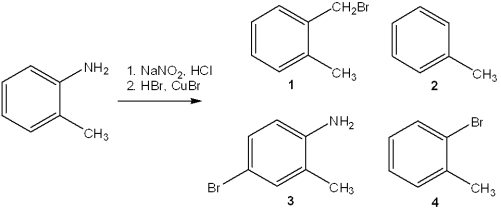
A)1
B)2
C)3
D)4

A)1
B)2
C)3
D)4

Unlock Deck
Unlock for access to all 88 flashcards in this deck.
Unlock Deck
k this deck
27
What is the major organic product obtained from the following reaction? 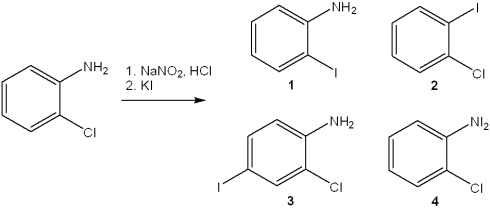
A)1
B)2
C)3
D)4

A)1
B)2
C)3
D)4

Unlock Deck
Unlock for access to all 88 flashcards in this deck.
Unlock Deck
k this deck
28
What is the major organic product obtained from the following reaction? 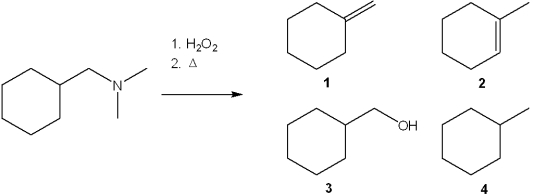
A)1
B)2
C)3
D)4

A)1
B)2
C)3
D)4

Unlock Deck
Unlock for access to all 88 flashcards in this deck.
Unlock Deck
k this deck
29
What is the major organic product obtained from the following sequence of reactions? 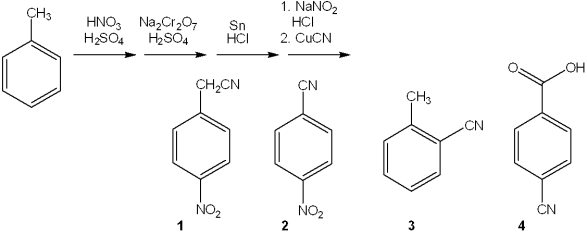
A)1
B)2
C)3
D)4

A)1
B)2
C)3
D)4

Unlock Deck
Unlock for access to all 88 flashcards in this deck.
Unlock Deck
k this deck
30
What is the major organic product obtained from the following reaction? 
A)1
B)2
C)3
D)4

A)1
B)2
C)3
D)4

Unlock Deck
Unlock for access to all 88 flashcards in this deck.
Unlock Deck
k this deck
31
What is the major organic product obtained from the following reaction? 
A)1
B)2
C)3
D)4

A)1
B)2
C)3
D)4

Unlock Deck
Unlock for access to all 88 flashcards in this deck.
Unlock Deck
k this deck
32
What is the major organic product obtained from the following reaction? 
A)1
B)2
C)3
D)4

A)1
B)2
C)3
D)4

Unlock Deck
Unlock for access to all 88 flashcards in this deck.
Unlock Deck
k this deck
33
What is the intermediate in the Hofmann elimination, in which a 1 or 2 alkyl halide is treated with trimethyl amine, followed by addition of silver(I) oxide and heat?
A)a tetraalkylammonium hydroxide salt
B)a tertiary amine
C)a 3 carbocation
D)an amine oxide
A)a tetraalkylammonium hydroxide salt
B)a tertiary amine
C)a 3 carbocation
D)an amine oxide

Unlock Deck
Unlock for access to all 88 flashcards in this deck.
Unlock Deck
k this deck
34
What is the intermediate in the Cope elimination, in which a 3 amine is treated with hydrogen peroxide followed by heat?
A)a tetraalkylammonium hydroxide salt
B)an amine oxide
C)a 3 carbocation
D)an amide anion
A)a tetraalkylammonium hydroxide salt
B)an amine oxide
C)a 3 carbocation
D)an amide anion

Unlock Deck
Unlock for access to all 88 flashcards in this deck.
Unlock Deck
k this deck
35
What is the major organic product obtained from the following reaction? 
A)1
B)2
C)3
D)4

A)1
B)2
C)3
D)4

Unlock Deck
Unlock for access to all 88 flashcards in this deck.
Unlock Deck
k this deck
36
What is the major organic product obtained from the following sequence of reactions? 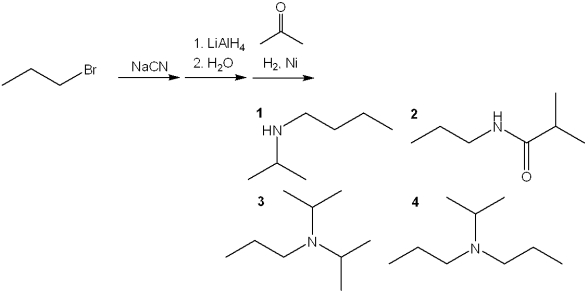
A)1
B)2
C)3
D)4

A)1
B)2
C)3
D)4

Unlock Deck
Unlock for access to all 88 flashcards in this deck.
Unlock Deck
k this deck
37
What is the major organic product obtained from the following reaction? 
A)1
B)2
C)3
D)4

A)1
B)2
C)3
D)4

Unlock Deck
Unlock for access to all 88 flashcards in this deck.
Unlock Deck
k this deck
38
What is the major organic product obtained from the following reaction? 
A)1
B)2
C)3
D)4

A)1
B)2
C)3
D)4

Unlock Deck
Unlock for access to all 88 flashcards in this deck.
Unlock Deck
k this deck
39
What is the major organic product obtained from the following sequence of reactions? 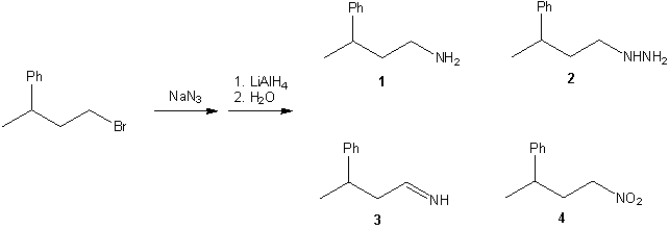
A)1
B)2
C)3
D)4

A)1
B)2
C)3
D)4

Unlock Deck
Unlock for access to all 88 flashcards in this deck.
Unlock Deck
k this deck
40
What is the major organic product obtained from the following sequence of reactions? 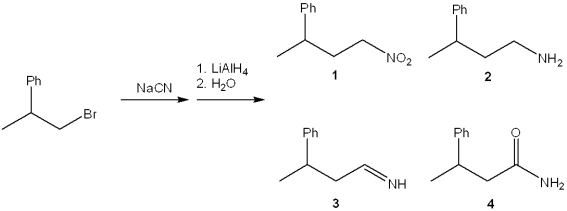
A)1
B)2
C)3
D)4

A)1
B)2
C)3
D)4

Unlock Deck
Unlock for access to all 88 flashcards in this deck.
Unlock Deck
k this deck
41
The compound circled below represents a heterocyclic amine. 


Unlock Deck
Unlock for access to all 88 flashcards in this deck.
Unlock Deck
k this deck
42
Which of the following amines can be prepared from an organic bromide reaction with potassium cyanide followed by reduction?
A)1-heptanamine
B)benzylamine
C)2-butanamine
D)tert-butyl amine
A)1-heptanamine
B)benzylamine
C)2-butanamine
D)tert-butyl amine

Unlock Deck
Unlock for access to all 88 flashcards in this deck.
Unlock Deck
k this deck
43
What is the major organic product obtained from the following sequence of reactions? 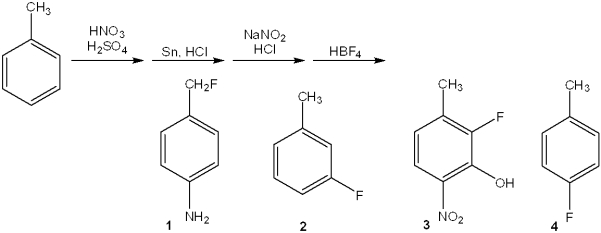
A)1
B)2
C)3
D)4

A)1
B)2
C)3
D)4

Unlock Deck
Unlock for access to all 88 flashcards in this deck.
Unlock Deck
k this deck
44
What is the major organic product obtained from the following sequence of reactions? 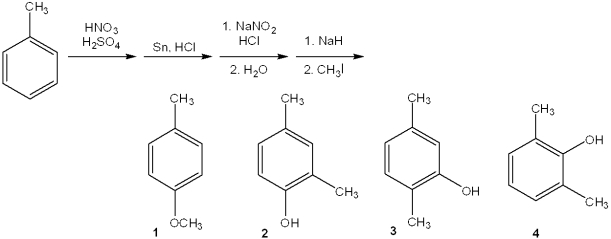
A)1
B)2
C)3
D)4

A)1
B)2
C)3
D)4

Unlock Deck
Unlock for access to all 88 flashcards in this deck.
Unlock Deck
k this deck
45
Aliphatic 3o amines with three different groups on nitrogen can be resolved.

Unlock Deck
Unlock for access to all 88 flashcards in this deck.
Unlock Deck
k this deck
46
Consider the following compounds.  Answer the following questions by filling in the blank with the appropriate number from the diagram or an appropriate term.
Answer the following questions by filling in the blank with the appropriate number from the diagram or an appropriate term.
The ammonia ion of substance ____ will have the largest pKa.
 Answer the following questions by filling in the blank with the appropriate number from the diagram or an appropriate term.
Answer the following questions by filling in the blank with the appropriate number from the diagram or an appropriate term.The ammonia ion of substance ____ will have the largest pKa.

Unlock Deck
Unlock for access to all 88 flashcards in this deck.
Unlock Deck
k this deck
47
The reaction of a 2o amine with nitrous acid gives a nitrosamine.

Unlock Deck
Unlock for access to all 88 flashcards in this deck.
Unlock Deck
k this deck
48
Which combination of carbonyl compound and amine can be used to prepare the following product by reductive amination? 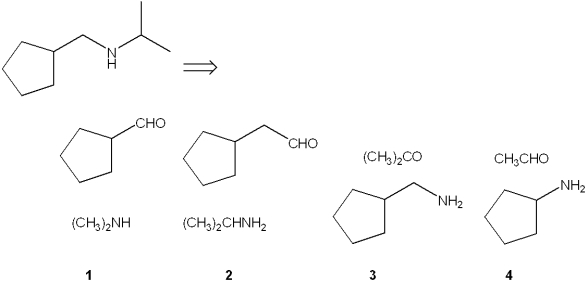
A)only 1
B)only 3
C)only 1 and 3
D)only 2 and 4

A)only 1
B)only 3
C)only 1 and 3
D)only 2 and 4

Unlock Deck
Unlock for access to all 88 flashcards in this deck.
Unlock Deck
k this deck
49
Which of the following amines can be prepared by treatment of a carbonyl compound with sodium cyanide in the presence of acid, followed by reduction? 
A)only 1
B)only 1 and 2
C)only 1, 2 and 3
D)1, 2, 3 and 4

A)only 1
B)only 1 and 2
C)only 1, 2 and 3
D)1, 2, 3 and 4

Unlock Deck
Unlock for access to all 88 flashcards in this deck.
Unlock Deck
k this deck
50
To separate a mixture of p-toluidine and p-nitrotoluene dissolved in ether,extract the ether solution with aqueous HCl and treat the water layer with aqueous NaOH.

Unlock Deck
Unlock for access to all 88 flashcards in this deck.
Unlock Deck
k this deck
51
Which of the following amines can be prepared from an organic bromide by reaction with sodium azide followed by reduction?
A)aniline
B)benzylamine
C)N-ethyl-2-butanamine
D)tert-butyl amine
A)aniline
B)benzylamine
C)N-ethyl-2-butanamine
D)tert-butyl amine

Unlock Deck
Unlock for access to all 88 flashcards in this deck.
Unlock Deck
k this deck
52
What is the major organic product obtained from the following sequence of reactions? 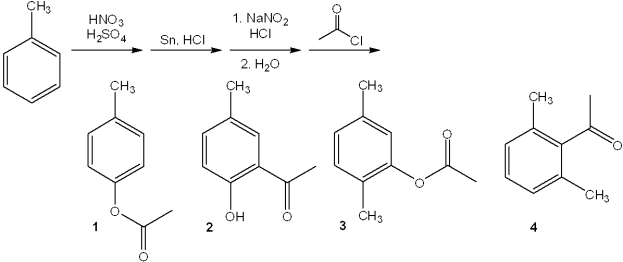
A)1
B)2
C)3
D)4

A)1
B)2
C)3
D)4

Unlock Deck
Unlock for access to all 88 flashcards in this deck.
Unlock Deck
k this deck
53
Which combination of carbonyl compound and amine can be used to prepare the following product by reductive amination? 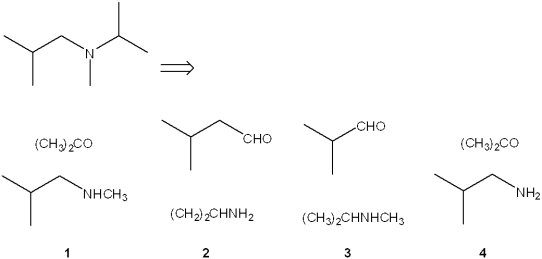
A)only 1
B)only 3
C)only 1 and 3
D)only 2 and 4

A)only 1
B)only 3
C)only 1 and 3
D)only 2 and 4

Unlock Deck
Unlock for access to all 88 flashcards in this deck.
Unlock Deck
k this deck
54
The pKa of methyl amine is represented by the following reaction. 


Unlock Deck
Unlock for access to all 88 flashcards in this deck.
Unlock Deck
k this deck
55
The following amine can be converted to an aryl diazonium salt. 


Unlock Deck
Unlock for access to all 88 flashcards in this deck.
Unlock Deck
k this deck
56
The following structure is classified as a 3° amine. 


Unlock Deck
Unlock for access to all 88 flashcards in this deck.
Unlock Deck
k this deck
57
Consider the following reaction.

The products of this reaction are shown below.

The products of this reaction are shown below.


Unlock Deck
Unlock for access to all 88 flashcards in this deck.
Unlock Deck
k this deck
58
The following represents an acid-base reaction between the given amine and HCl. 


Unlock Deck
Unlock for access to all 88 flashcards in this deck.
Unlock Deck
k this deck
59
Which of the following amines can be prepared by ring opening of an epoxide with sodium amide followed by reduction? 
A)only 1
B)only 1 and 2
C)only 1 and 4
D)1, 2, 3 and 4

A)only 1
B)only 1 and 2
C)only 1 and 4
D)1, 2, 3 and 4

Unlock Deck
Unlock for access to all 88 flashcards in this deck.
Unlock Deck
k this deck
60
Which of the following amines can be prepared by reduction of an amide?
A)tert-butyl amine
B)2-hexanamine
C)N-methyl-1-butanamine
D)aniline
A)tert-butyl amine
B)2-hexanamine
C)N-methyl-1-butanamine
D)aniline

Unlock Deck
Unlock for access to all 88 flashcards in this deck.
Unlock Deck
k this deck
61
Provide a brief explanation, based on features of the molecules, for the following difference in pKa values?
CH3NH2 > PhNH2
10.64 4.63
CH3NH2 > PhNH2
10.64 4.63

Unlock Deck
Unlock for access to all 88 flashcards in this deck.
Unlock Deck
k this deck
62
What is the major organic product obtained from the following reaction? 


Unlock Deck
Unlock for access to all 88 flashcards in this deck.
Unlock Deck
k this deck
63
Consider the following compounds.  Answer the following questions by filling in the blank with the appropriate number from the diagram or an appropriate term.
Answer the following questions by filling in the blank with the appropriate number from the diagram or an appropriate term.
The name of the product formed by reacting CuCl and HCl with benzenediazonium chloride is ________________________.
 Answer the following questions by filling in the blank with the appropriate number from the diagram or an appropriate term.
Answer the following questions by filling in the blank with the appropriate number from the diagram or an appropriate term.The name of the product formed by reacting CuCl and HCl with benzenediazonium chloride is ________________________.

Unlock Deck
Unlock for access to all 88 flashcards in this deck.
Unlock Deck
k this deck
64
What is the IUPAC name of the following compound? 


Unlock Deck
Unlock for access to all 88 flashcards in this deck.
Unlock Deck
k this deck
65
Consider the following substances. 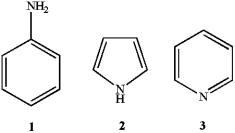 Complete the following statements using the appropriate number.
Complete the following statements using the appropriate number.
Substance _____ is pyridine.
 Complete the following statements using the appropriate number.
Complete the following statements using the appropriate number.Substance _____ is pyridine.

Unlock Deck
Unlock for access to all 88 flashcards in this deck.
Unlock Deck
k this deck
66
Consider the following substances.  Complete the following statements using the appropriate number.
Complete the following statements using the appropriate number.
Substance _____ is aniline.
 Complete the following statements using the appropriate number.
Complete the following statements using the appropriate number.Substance _____ is aniline.

Unlock Deck
Unlock for access to all 88 flashcards in this deck.
Unlock Deck
k this deck
67
Provide a line-bond structure of N,N-dimethylcyclopentanamine.

Unlock Deck
Unlock for access to all 88 flashcards in this deck.
Unlock Deck
k this deck
68
What is the major organic product obtained from the following sequence of reactions? 


Unlock Deck
Unlock for access to all 88 flashcards in this deck.
Unlock Deck
k this deck
69
What is the major organic product obtained from the following sequence of reactions? 


Unlock Deck
Unlock for access to all 88 flashcards in this deck.
Unlock Deck
k this deck
70
What is the IUPAC name of the following compound? 


Unlock Deck
Unlock for access to all 88 flashcards in this deck.
Unlock Deck
k this deck
71
What is the major organic product obtained from the following sequence of reactions? 


Unlock Deck
Unlock for access to all 88 flashcards in this deck.
Unlock Deck
k this deck
72
Consider the following substances.  Complete the following statements using the appropriate number.
Complete the following statements using the appropriate number.
Substance _____ is pyrrole.
 Complete the following statements using the appropriate number.
Complete the following statements using the appropriate number.Substance _____ is pyrrole.

Unlock Deck
Unlock for access to all 88 flashcards in this deck.
Unlock Deck
k this deck
73
Consider the following compounds.  Answer the following questions by filling in the blank with the appropriate number from the diagram or an appropriate term.
Answer the following questions by filling in the blank with the appropriate number from the diagram or an appropriate term.
The ammonia ion of substance ____ will have the smallest pKa.
 Answer the following questions by filling in the blank with the appropriate number from the diagram or an appropriate term.
Answer the following questions by filling in the blank with the appropriate number from the diagram or an appropriate term.The ammonia ion of substance ____ will have the smallest pKa.

Unlock Deck
Unlock for access to all 88 flashcards in this deck.
Unlock Deck
k this deck
74
What is the major organic product obtained from the following sequence of reactions? 


Unlock Deck
Unlock for access to all 88 flashcards in this deck.
Unlock Deck
k this deck
75
What is the major organic product obtained from the following sequence of reactions? 


Unlock Deck
Unlock for access to all 88 flashcards in this deck.
Unlock Deck
k this deck
76
Consider the following compounds.  Answer the following questions by filling in the blank with the appropriate number from the diagram or an appropriate term.
Answer the following questions by filling in the blank with the appropriate number from the diagram or an appropriate term.
Substance _____ is a primary alkyl amine.
 Answer the following questions by filling in the blank with the appropriate number from the diagram or an appropriate term.
Answer the following questions by filling in the blank with the appropriate number from the diagram or an appropriate term.Substance _____ is a primary alkyl amine.

Unlock Deck
Unlock for access to all 88 flashcards in this deck.
Unlock Deck
k this deck
77
Consider the following compounds.  Answer the following questions by filling in the blank with the appropriate number from the diagram or an appropriate term.
Answer the following questions by filling in the blank with the appropriate number from the diagram or an appropriate term.
The name of the product formed by reacting KCN and CuCN with benzenediazonium chloride is ________________________.
 Answer the following questions by filling in the blank with the appropriate number from the diagram or an appropriate term.
Answer the following questions by filling in the blank with the appropriate number from the diagram or an appropriate term.The name of the product formed by reacting KCN and CuCN with benzenediazonium chloride is ________________________.

Unlock Deck
Unlock for access to all 88 flashcards in this deck.
Unlock Deck
k this deck
78
Provide a brief explanation, based on features of the molecules, for the following trend in pKa values?  4.15 4.63 1.0
4.15 4.63 1.0
 4.15 4.63 1.0
4.15 4.63 1.0
Unlock Deck
Unlock for access to all 88 flashcards in this deck.
Unlock Deck
k this deck
79
Provide a line-bond structure of N-methylaniline.

Unlock Deck
Unlock for access to all 88 flashcards in this deck.
Unlock Deck
k this deck
80
Provide a brief explanation, based on features of the molecules, for the following difference in pKa values?
CH3NH2 > NH3
10.64 9.26
CH3NH2 > NH3
10.64 9.26

Unlock Deck
Unlock for access to all 88 flashcards in this deck.
Unlock Deck
k this deck


